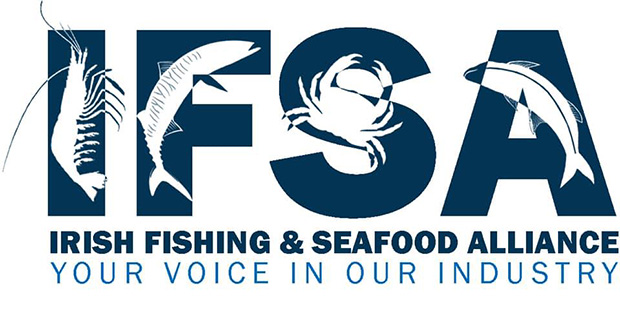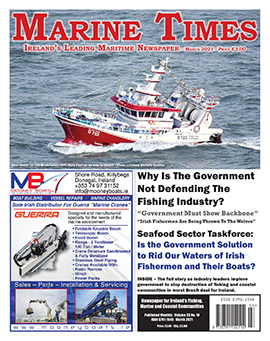The Cosy Cartel
An entire generation of fishermen, seafood workers, their families, and the populations of Ireland’s coastal communities are demanding a response from Ireland’s political leaders and the fishing industry’s governing authorities as to why the strongly publicised calls for defence of this sector from a corrupt EU regime are being met with a stony silence. “Among the numerous areas requiring close investigation is the Department of the Marine’s relationship with the Commission. Here we have one group of unelected officials, which is believed to be heavily infiltrated by the interests of the Spanish, French and Dutch fishing industries, instructing another group of unelected officials to implement their agenda on the Irish fishing industry” - Cormac Burke, Chairman of the Irish Fishing & Seafood Alliance (IFSA).

Ireland’s recent dismal performance in the Brexit negotiations raises a number of very serious questions which must urgently be answered.
At every turn in our country’s fishery dealings with Europe we are on the losing side.
This consistency of failure after successive failure presents too many defeats to be allowed go without being challenged.
“As a democracy, there should be nothing hidden IF everything was above board.”
The industry deserves and demands an independent investigation into these huge failures as they are resulting in massive losses to the State — any responsible and logical government would initiate a completely independent investigation, without having to be pushed, after a single failure so that lessons can be learned and the mistakes identified in order to avoid additional future losses.
There are no good reasons why we should not examine the sequence of events in detail and, as a democracy, there should be nothing hidden if everything was above board.
We are entitled to know who lead the negotiations, who benefitted by our disproportionate surrender and precisely who agreed to the gifting of our nation’s resources and why.
It is totally unacceptable to argue that the Commission wouldn’t allow this or that as on this occasion we had the power of veto and could have used it to secure, and probably strengthen, our position.
If the people who represent Ireland in these talks are not capable of operating in the country’s best interests then they should have the honour to step down. Unfortunately, we know from experience that politicians rarely do the job for which they are very well paid and seem to interpret their responsibilities as beginning and ending in front of the national media’s microphones.
Sadly, it is not possible to recall when a Minister with responsibility for fisheries adequately informed himself of his brief. Historically, his laziness, despite surrounding himself with costly ‘specialist’ advisors, has resulted in decisions being made by senior civil servants who are never accountable and who continuously fail the people who pay their wages.
It is recognized throughout the fishing industry that senior civil servants are not only incapable of representing the best interests of Ireland’s fishing and coastal communities but are perceived as being actively anti-industry.
The demanded enquiry is essential in order to answer the fundamental questions behind this perceived tyranny — this enquiry must:
* identify if powers have been abused in relation to the targeted use of the SFPA and the Navy;
* identify if one individual holds excessive authority in the control of appointments to a range of state agencies;
*identify if one individual has too much control over the spending of European funds;
*identify the co-ordinator, and his or her motivation, of the multi-agency raids on the in- harbour fishing fleets which proved to be a huge waste of State resources;
*identify why senior civil servants completely fail to answer positive correspondence from the industry.
The fishing industry throughout the coast will happily furnish the enquiry, when it invites submissions as it must, with many more instances where independent scrutiny is required.
Importantly, the investigation must unearth the precise reason why these employees of the State work against its best interests.
Questions also need to be asked of our senior civil servants as to:
· Why are there no cameras on Dutch freezer trawler's factory deck but EU regulations that there must be cameras in Irish pelagic processing factories?
· Why did the DAFM acquiesce on Voisinage and now UK threaten not to allow Irish boats to Rockall and have implemented a reference period for access of Irish boats to their waters? Where is the quid pro quo?
· Is all this pandering to the EU in anticipation of plush jobs in Europe following retirement from DAFM on a fat pension… are there any employment contract clauses to safeguard against such conflicts?
· Who in DAFM insisted that an unjust, unreasonable and unfair penalty points system must be introduced?
· Why have DAFM not publicly rebuked. in the strongest possible terms, the preposterous calls from EU for Irish quota cuts based on unqualified and unsubstantiated information gained from a poorly implemented audit?
Among the numerous areas which require close investigation is the Department of the Marine’s relationship with the EU Commission — here we have one group of unelected officials, which is believed to be heavily infiltrated by the interests of the Spanish, French and Dutch industries, instructing another group of unelected officials to implement their agenda on the Irish fishing industry.
Our department inevitably set about the implementation of these instructions with gusto. They are like a lad at in the schoolyard who can’t stand up for himself with his peers but who knocks the stuffing out of his little siblings when he gets home where he thinks he’s the big man.
The Commission have no credibility. Any group who talk about sustainability and then reduce the size of gill-net mesh from 120mm to 100mm after Spanish vessels are caught using the illegal mesh cannot expect to be heard.
When the Commission reduced the minimum size of megrim which could be landed, under so-called ‘Technical Conservation Measures’, again because of Spanish demands, they sold their credibility.
Why has there been zero focus by the EU Commission on European pelagic freezer vessels who have the wonderful ability to only catch larger sizes of fish whilst other vessels catch a more natural mixture of fish sizes?
This same Commission prefer to make the news when they demand that the Irish pelagic industry must weigh chilled water as fish while the Dutch are helping themselves, through Brexit and the ownership of British quota, to fish which we through our typical Department, cannot surrender quickly enough.
This toxic relationship and the consequences of it must be forensically examined by the independent external investigation so that the question of corruption or ineptitude can be answered.
.jpg)


.jpg)
.jpg)
 Facebook
Facebook Twitter
Twitter